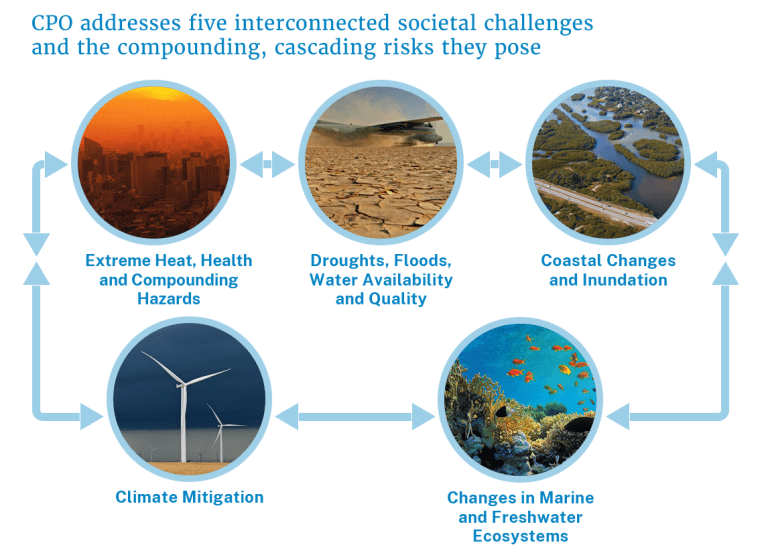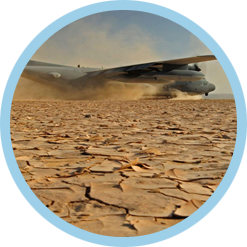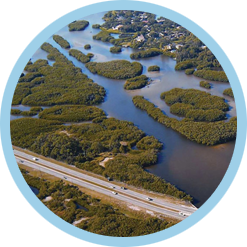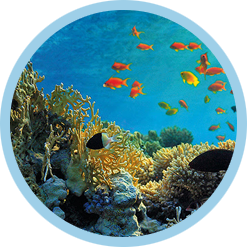Science and Services Helping Society Address Climate Challenges
People in every region and sector are grappling with the changing nature and frequency of weather and climate extremes, and they’re seeking authoritative scientific information and services to help them plan and prepare. To meet increasing public demand, and in alignment with NOAA’s Strategic Plan to build a Climate Ready Nation, the Climate Program Office (CPO) is prioritizing five urgent, climate-related challenges facing society:
- Extreme heat that produces compounding hazards and threatens human health;
- Droughts and floods that impact water availability and quality;
- Coastal changes caused by sea level rise, erosion, and stronger storms;
- Environmental changes that threaten marine and freshwater ecosystems and the communities that rely on them; and
- Mitigation strategies to lessen or avoid these societal risks by slowing or stopping the human causes of global warming.
CPO leverages and integrates its investments in cutting-edge cross-disciplinary climate research, scientific assessments, capacity building, tool development, and public education. This work requires close working relationships with NOAA’s research labs and service line offices, and other Federal science service providers as well as partners in academia, commercial, and non-profit sectors. CPO leads, co-develops, and evolves integrated information systems and other science-based services to help people understand their exposures to climate hazards, and actions they can take to reduce risks and take advantage of new opportunities.
hips. Our various partners include the U.S. Global Change Research Program, NASA, National Science Foundation, National Academy of Sciences, National Snow and Ice Data Center, U.S. Departments of Interior and Agriculture, National Institutes of Health, Cooperative Institute for Research in Environmental Sciences, National Science Teachers Association, American Meteorological Society, and the American Association for the Advancement of Science.



Extreme Heat, Health and Compounding Hazards
The problem: Heat waves over land and in the ocean are projected to increase in intensity, frequency, duration, and geographical extent. Adverse heat-health risks, including premature mortality and poor quality of life, are very likely to worsen as temperatures rise. Society needs information to understand, plan for, and take actions to reduce compounding heat and health risks.
Our vision of a better future: Every individual American and U.S. community understands their heat risk, and has the information and resources they need to protect people, property, infrastructure, and natural resources.


Droughts, Floods, Water Availability and Quality
The problem: Different regions of the United States face the challenges of too little water, too much water, and poor water quality. Water users, agricultural producers, natural resource managers, energy utilities, planners, community members, and others must be able to assess the risks of drought – especially under a changing climate – before its onset and during its evolution to make informed decisions and implement effective actions to minimize risk.
Our vision of a better future: CPO envisions and is working toward a future in which all regions of the United States have the knowledge and capacity to plan for and respond to changes in water quantity and quality to minimize impacts and risks.


Coastal Changes and Inundation
The problem: U.S. coastal communities are grappling with flooded streets, overflowing sewers, water-borne disease outbreaks, and eroding shorelines. The confluence of rising sea level, heavier precipitation, stronger storm surges, and more impervious surface area with inadequate drainage systems causes compounding impacts in these communities. Residents, businesses, and planners are all seeking information and expertise to help them understand, prepare for, and adapt to these accelerating changes resilient to reduce their risk.
Our vision of a better future: CPO envisions communities and businesses across the Nation having the knowledge and capacity to prepare for changes along the coast by implementing effective resilience strategies.


Changes in Marine and Freshwater Ecosystems
The problem: The ocean and freshwater systems play a crucial role in the health and well-being of all ecosystems on Earth. Yet, the pace, scale, and pervasive nature of the changes in marine and freshwater environments pose serious threats to those ecosystems and the communities that depend on them. Stewards and managers of these valuable natural resources need timely data and information to understand ongoing climatic and environmental changes to guide and inform their adaptation strategies.
Our vision of a better future: CPO envisions communities all across the Nation using the best-available science and services to inform actions they take to protect marine and freshwater ecosystems, and the communities that rely on them, from extreme warming, decreasing sea ice, and harmful changes in ocean currents and chemistry. We also envision commercial fisheries, aquaculture, and protected habitats thriving and adapting in a changing climate.


Climate Mitigation
The problem: Human emissions of heat-trapping gases are causing our world to warm by an amount and rate that threatens the health and well-being of humans and all life on Earth. There’s increasing public demand for information about options to reduce current and future greenhouse gas emissions and concentrations, and their environmental impacts. Communities, businesses, planners, and policy makers are all seeking authoritative information to help guide and inform their strategies for reducing carbon and other greenhouse gas emissions.
Our vision of a better future: CPO envisions communities, businesses and different levels of government across the Nation and world using best-available science to inform a range of actions to reduce and avoid the human drivers of our changing climate.

